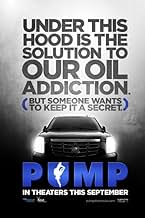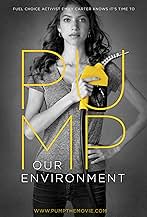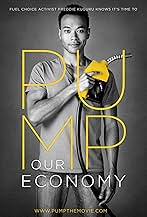A documentary that tells the story of America's addiction to oil, from its corporate conspiracy beginnings to its current monopoly today, and explains clearly and simply how we can end it - ... Read allA documentary that tells the story of America's addiction to oil, from its corporate conspiracy beginnings to its current monopoly today, and explains clearly and simply how we can end it - and finally win choice at the pump.A documentary that tells the story of America's addiction to oil, from its corporate conspiracy beginnings to its current monopoly today, and explains clearly and simply how we can end it - and finally win choice at the pump.
- Directors
- Writer
- Stars
Greg Anderson
- Self - Author. Designated Drivers
- (as Dr. Greg Anderson)
Daniel Caesar
- Self
- (as Daniel Ceasar)
Luiz Inácio Lula da Silva
- Self
- (as Luiz 'Lula' da Silva)
- Directors
- Writer
- All cast & crew
- Production, box office & more at IMDbPro
Featured reviews
The general idea of the movie makes a lot of sense, but I am a Brazilian and what they say about Brazil is so terribly wrong and unreal... Sounds like the former president Lula paid for the movie. Just minutes with false propaganda. I can't tell about all the rest, which as I said makes sense, however, the part that I know about makes me think the whole thing wasn't properly investigated at all. Brazil is in a terrible economic crisis... We could say that the movie is from 2012/2013, when things were a bit better, but even though, the ethanol is far far far away from being a competitor beside gas. It was never Lula's, like the movie makes people think. They say 40% of our population entered in the middle class, but what happened is that the government intentionally changed the measuring, so after Lula, anyone who makes 2,500 USD a year (!) can be considered in middle class. It's just ridiculous... and the producers didn't investigate it. They certainly only heard one side of the story... which is the worst thing a documentarist can do.
Greetings again from the darkness. Documentaries with a message are usually most effective when they engage in debate ... share both sides of the argument, if you will. Preaching from a soapbox typically causes the viewer to tune out, and the opportunity is missed. The one exception to this is when the stance is heavily supported with history, facts, data, research and pertinent interviews. Husband and wife co-directors Joshua Tickell and Rebecca Harrell Tickell deliver what amounts to a visual thesis on how to break the big oil monopoly.
Beginning with a colorful montage of beautiful and colorful automobiles, we are quickly reminded of Americans love of their cars which leads to the addiction to oil. The next 90 minutes provides a trek through the key historical events that led to our oil dependency, and ends with a proposal on how to stop it.
The history lesson discusses John D Rockefeller and his Standard Oil monopoly, followed by his political influence to get Prohibition passed. This after Henry Ford called alcohol "the perfect fuel". We then learn of how large companies drove out the trolley system in favor of an interstate freeway system for cars. We re-live the 1973 gas shortage as the Arab countries flexed - or extorted, depending on your take. Jumping to 2008, the surge in oil prices to $147 per barrel is described as the economic earthquake, with the Stock Market crash termed an aftershock. In other words, oil is the foundation of our economy. Today's global market is discussed along with the exponential growth of China's car industry - 15 million cars sold this year. This time-line with specific data leads to the impressive second half of the film ... how to get ourselves out of this mess.
For those who say it's foolish to discuss breaking our dependency on oil because it is used in so many other ways, they are missing the point. The cause is less oil dependency for cars, not a total break from it's use in products such as medicines, clothes, plastics, etc. The filmmakers offer the options of both electric cars and alternative fuel sources.
Elon Musk's Tesla Motors is briefly discussed, with the acknowledgment that battery technology improvement is vital to the future success of electric cars. A more immediate solution comes in the form of alternative fuels - ethanol and methanol. We see the exceptional strides Brazil has made with strong leadership. We see how our current vehicles already have the capability to run on these biofuels, if not for a simple software adjustment built-in by auto-makers. Nine million flex fuel cars on the road now, and many of these owners remain unaware of their options. Why? Because fueling stations are so tough to come by, as only the most independent of stations are not contractually obligated to big oil companies.
The film is exceptionally well researched and the data delivered in an easy to understand format. The Tickell team won the Sundance award for the 2008 documentary Fuel, and their message is even stronger this time out. By the way, Ms. Tickell is a former child actress known as Sam Elliot's daughter in the 1989 Christmas classic Prancer. She and her husband are now renowned environmental activists, and this project is really a call to action ... the choices are available NOW to break the oil monopoly.
Beginning with a colorful montage of beautiful and colorful automobiles, we are quickly reminded of Americans love of their cars which leads to the addiction to oil. The next 90 minutes provides a trek through the key historical events that led to our oil dependency, and ends with a proposal on how to stop it.
The history lesson discusses John D Rockefeller and his Standard Oil monopoly, followed by his political influence to get Prohibition passed. This after Henry Ford called alcohol "the perfect fuel". We then learn of how large companies drove out the trolley system in favor of an interstate freeway system for cars. We re-live the 1973 gas shortage as the Arab countries flexed - or extorted, depending on your take. Jumping to 2008, the surge in oil prices to $147 per barrel is described as the economic earthquake, with the Stock Market crash termed an aftershock. In other words, oil is the foundation of our economy. Today's global market is discussed along with the exponential growth of China's car industry - 15 million cars sold this year. This time-line with specific data leads to the impressive second half of the film ... how to get ourselves out of this mess.
For those who say it's foolish to discuss breaking our dependency on oil because it is used in so many other ways, they are missing the point. The cause is less oil dependency for cars, not a total break from it's use in products such as medicines, clothes, plastics, etc. The filmmakers offer the options of both electric cars and alternative fuel sources.
Elon Musk's Tesla Motors is briefly discussed, with the acknowledgment that battery technology improvement is vital to the future success of electric cars. A more immediate solution comes in the form of alternative fuels - ethanol and methanol. We see the exceptional strides Brazil has made with strong leadership. We see how our current vehicles already have the capability to run on these biofuels, if not for a simple software adjustment built-in by auto-makers. Nine million flex fuel cars on the road now, and many of these owners remain unaware of their options. Why? Because fueling stations are so tough to come by, as only the most independent of stations are not contractually obligated to big oil companies.
The film is exceptionally well researched and the data delivered in an easy to understand format. The Tickell team won the Sundance award for the 2008 documentary Fuel, and their message is even stronger this time out. By the way, Ms. Tickell is a former child actress known as Sam Elliot's daughter in the 1989 Christmas classic Prancer. She and her husband are now renowned environmental activists, and this project is really a call to action ... the choices are available NOW to break the oil monopoly.
This movie is very slick, in both the good and bad meanings of that word. It does not bother with qualifying statements at all. In discussing Ethanol from sugarcane in Brazil, they do not discuss the environmental impact from clear cutting and burning. There is no real discussion of the break even point or capitalization required for methanol and ethanol production.
Several other issues:
* Flex Fuel may require fitting changes as well as a new ECU.
* Modern Flex Fuel automotive equipment was developed by a consortium.
* Trots out the GM trolley car conspiracy without any evidence.
* Claims that Prohibition targeted Ethanol fuel without any evidence.
I wish I could trust this documentary at all.
Several other issues:
* Flex Fuel may require fitting changes as well as a new ECU.
* Modern Flex Fuel automotive equipment was developed by a consortium.
* Trots out the GM trolley car conspiracy without any evidence.
* Claims that Prohibition targeted Ethanol fuel without any evidence.
I wish I could trust this documentary at all.
This is another one of the extremely popular American documentaries in the series: "The government and big companies are Illuminati. The are fighting the public and destroying the world. USA is not free. Take a stand and spread this message and this very specific solution to a very complicated problem!". This is therefore not a "true" documentary about a subject but a subjective message. The good thing is that these documentaries are very entertaining, fast-paced and often very informative and colorful. The bad thing is the fact that they always present a god guy/bad guy story with a clear choice at the end. There are very few untruth in this documentary but many things are left unsaid or unexplored and not a single bad thing is said about ethanol, not a single.
Ethanol is not being used because it is very expensive to make in colder climates like the USA. Majs is not a good crop for that at all and majs is not a good crop for anything. Yes, cows eat it, but we have to change cows so that they will not die from it. And we make suger out of it - not something great. Furthermore majs is grown by the government otherwise it would not be profitable. 0 of these facts were told. I wonder why? It's still very polluting and if USA wants to run on ethanol alone they would probably need the territory at least 3 times the size of the country to grow it on. It is a very ineffective energy source. Without a HUGE subsidy it will never compete with oil, coal or nuclear power. And the documentary puts nuclear power in the same category as oil, gas and coal. They forgot to mention that it is CO2 free, cheap and the safest energy source in the world. Ups... watch Pandoras Promise and other energy documentaries to get a fuller picture. And read the excellent God Species.
Ethanol is not being used because it is very expensive to make in colder climates like the USA. Majs is not a good crop for that at all and majs is not a good crop for anything. Yes, cows eat it, but we have to change cows so that they will not die from it. And we make suger out of it - not something great. Furthermore majs is grown by the government otherwise it would not be profitable. 0 of these facts were told. I wonder why? It's still very polluting and if USA wants to run on ethanol alone they would probably need the territory at least 3 times the size of the country to grow it on. It is a very ineffective energy source. Without a HUGE subsidy it will never compete with oil, coal or nuclear power. And the documentary puts nuclear power in the same category as oil, gas and coal. They forgot to mention that it is CO2 free, cheap and the safest energy source in the world. Ups... watch Pandoras Promise and other energy documentaries to get a fuller picture. And read the excellent God Species.
The word "choice" comes up again and again in this movie to promote alternative fuels, but it doesn't present solid grounds for choosing, and indeed seems to be advocating for government to force adoption. This is simply propaganda. It does provide a basic introduction to the various fuel options, their history and current use, which casts doubt on gasoline's status as the standard fuel, particularly in terms of emissions. But the claim that US oil companies rigged the market to force us to use oil conflicts with warnings of foreign control, and the assertion that Prohibition was engineered by Rockefeller to stop ethanol vehicles pushes the narrative into the realm of conspiracy theory. Not once does the movie mention that biofuel has less energy per gallon, and the production of electricity to charge electrics is also left hazy, so the economics aren't even touched upon. "Choice" is hardly desirable if it means you will be choosing badly.
Did you know
- TriviaWon the 2015 "Falsie" award for hidden agendas in documentaries
Details
Box office
- Budget
- $2,000,000 (estimated)
- Gross US & Canada
- $89,787
- Opening weekend US & Canada
- $42,200
- Sep 21, 2014
- Gross worldwide
- $89,787
- Runtime
- 1h 28m(88 min)
- Color
Contribute to this page
Suggest an edit or add missing content

























